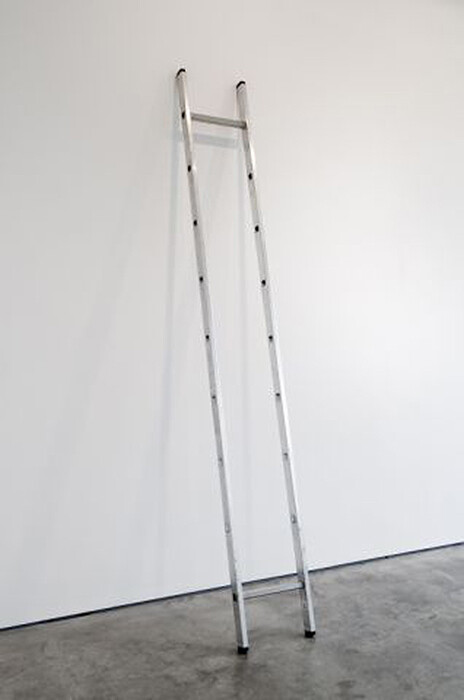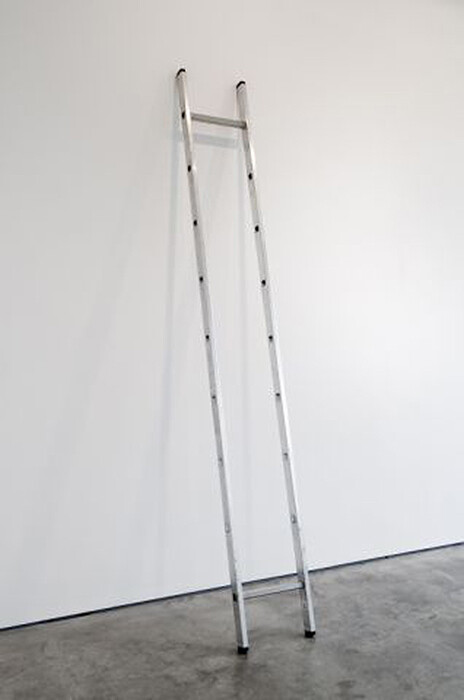There’s a kind of neo-conceptualism that loves puns. After all, it was old-style conceptualism that first sternly denounced the usually invisible join between object, language, and concept, but that was only on the back of the dry wit of conceptualism’s own errant uncle, Marcel Duchamp, who, unlike his dour descendants, couldn’t resist the ludic anarchism of wordplay and wayward signification. In the middle of winter, you’re always forced to smile at Duchamp’s snow shovel, In Advance of the Broken Arm (1915).
Ceal Floyer is member of the school of neo-conceptualist absurdism, and part of a self-consciously self-deprecating and quotidian strand of post-90s British art that, along with contemporaries such as Martin Creed or Jonathan Monk, reworked the lessons of conceptualism, while re-grounding it in the cheerfully humdrum experiences of the everyday.
Here Floyer keeps things colorless, using the aesthetic negative of conceptualist monochrome against the often bad-pun levity of her linguistic short-circuits. So Ladder (minus 2-8) (2010) is a standard aluminium house ladder with every rung removed except its first and ninth step. It might as well be titled In Advance of the Broken Leg, but it serves as a quick-fire assertion of Floyer’s interest in how minor gestures carried out on ordinary things immediately project them into the non-utilitarian function of art, and how the linguistic then detaches meaning from its usual object—Ladder is no longer a ladder, as it can no longer be climbed, yet neither is it anything other than a ladder, albeit one with rungs subtracted, which makes it…what, exactly?
That meaning should appear in the gap between object and language is a motif of the show. With Matches / Match (2010), three custom made matchboxes sit on a thin ledge, each open to slightly reveal a full box of matches, two boxes paired close together, set apart from a third. The punchline is in the mix-up between plural and singular, between what constitutes a “match” (the quality of being the same) between two sets of matches (little wooden sticks), or whether two different instances of matching can be detected among the matches—all of which has one squinting for minute resemblances and similarities; futile of course, as one realizes that all matches, given their primitive manufacture, never, in the end, really match.
Word and object get conclusively confused in the installation Things (2009): a room full of white plinths supporting embedded speakers rather than the objects one would expect. The word “thing” is broadcast from each speaker in an erratic sequence around the room, with each “thing” being a snippet from a different pop song in which the word is heard. Things may be Floyer’s crowning anti-Kosuth; after all, while the master had to find an actual, specific chair in One and Three Chairs (1965) in order to then demonstrate its conceptual and representational abstractions (the dictionary definition of chair, a photograph of a chair), here Floyer uses the abstraction of all objects (“things”) only to then re-embody them, paradoxically, in the aural particularity of each different utterance of “thing,” no longer an abstraction, but a specific “thing” which is still not a “thing.”
What constitutes an object is further played with in Page 11,083 of 11,083 (2010), nothing more than a plinth-sized stack of A4 printed sheets, the top of which proclaims itself as the terminal page. A furtive checking of pages further down reveal that they too know their exact place in the order, so that what is little more than a well-stacked Word document turns itself into a minimalist object of absolute dimensional, yet wholly conceptual certitude.
If the whole show is predicated on a notion of absence-as-presence, this finds its culmination in Fascimile (2010), which, once you’ve penetrated the boredom threshold of watching white paper being drawn in and out of what must be a fax feeder, vaguely hints that what this fax might be doing is—watch out, here it comes—faxing and receiving a sheet of white paper.
These involuted and recursive demonstrations tell us that ideas are things that nevertheless need things to exist. Free of the anti-modernist heroics of early analytical conceptualism, Floyer is really a hedonist in ascetic’s clothing, for the simple reason that the experience of these conceptual-material standoffs induces pleasure in the act of recognising them. This is a pleasure that exceeds humour, but Floyer’s position must necessarily contain both—there are, after all, no more battles to fight against modernism, and the neo-conceptualist object bears witness to how such gestures no longer have a radical agenda to pursue, ensconced in a culture that now affirms their legitimacy. And in those circumstances, why not have fun?





